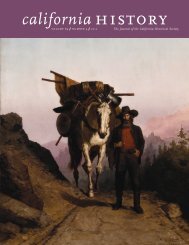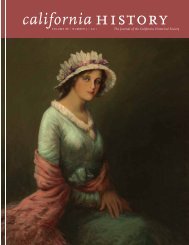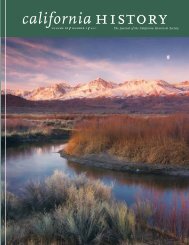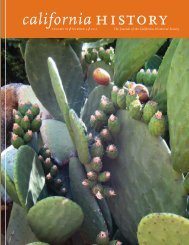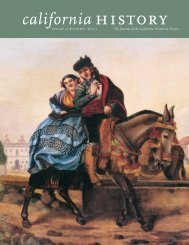Canyon, and the mighty Colorado River (whichalmost took his life when he and another manattempted a crossing on a log raft), he realizedthat he could not go back to cataloguing books.His mother advanced the opinion that he wouldhave more chances to “spread” (his wings) inwide-open <strong>California</strong> than in the nation’s cliquishcapital. Responding to her prodding, Sib agreedto try sheep ranching with his brother. 39Though he enjoyed donning a sombrero andspurs and riding the range astride a horse bearinga beautiful Mexican saddle laden with heavyleather trappings, in 1874 the former Harvardman accepted with alacrity an offer of a year’semployment as president of Santa Barbara College,a private boys’ school. He missed cultivatedBoston, he confided earlier to his youngerbrother, Pierre, “for in my late wanderings Ihave come upon no place to be compared to it.”But pride kept him from returning home: “I’vealmost resolved never to go back [to Boston] untilI’ve done something worth mentioning, moneywiseor otherwise—since I’ve really broken away,& should return only to find all my friends andclassmates far ahead in their life-work.” 40As soon as Seymour and Sibley were situatedin southern <strong>California</strong>, T.C. began to dreamabout joining them. “Don’t make a start hitherward. . . without something definite in hand orfunds enough to do something with,” Seymourhad cautioned T.C. in early 1873. “Cash is everythinghere.” 41But prospects were all that T.C. had. His positionat Boston’s North National Bank was of lowrank—as of 1875 he still reported to the bank’scashier—but it did provide a steady income.The problem was T.C.’s poor luck with investments.Shortly after the Civil War, he had beenpersuaded to buy into an Alabama coal mine by aBoston businessman who was building a railroadin the South and promised to purchase a substantialportion of the mine’s output. Unfortunately,the decision to employ African Americans,which Severance would have wholeheartedlysupported, subjected the mine to frequent raidsby the Ku Klux Klan, and the disruptions turnedwhat seemed to be a sure bet into a financial disappointment.42By 1873, T.C. had sufficiently recovered from thissetback to be able to consider an investment ina railroad company as a means of securing his<strong>California</strong> grubstake. Two years later, he hadyet to build the needed cash reserve. Nonetheless,he couldn’t resist talking about his plannedrelocation to Santa Barbara. “[A]lmost to a man,”the friends with whom he shared the news haddeemed the move “a wise one,” he informedhis skeptical wife, provided that “we have somethingto do, or fall back upon, on arrival out.”T.C. was gratified that his confidants were not“backward” in admitting to their envy of the Severances’opportunity to experience <strong>California</strong>’s“climate and the trip over, with all their variety &charms. . . .” 43Caroline was not opposed to the move in theory.She had accommodated her husband’s careermoves once before, following him to Port Royal,South Carolina, where he had been appointedcollector of customs for the Union-occupiedharbor by Secretary of the Treasury Salmon P.Chase, a “free soil” advocate from Ohio whosepresidential aspirations T.C. actively had supported.Five or so years after they had returnedto Boston, the Severances had begun to considerthe possibility of relocating to America’s westernfrontier. Caroline was over fifty and her husbandwas approaching sixty, but, as she explained atthe time, “I do not consider myself finished andhave not limited my ambition by what, to others,may seem more realistic. Even now Theodoreand I talk of moving to the West, perhaps <strong>California</strong>,to carry on our work of organizing people forthe improvement of the human condition.” 44 <strong>California</strong> History • volume 88 number 1 2010
But Caroline thought it imprudent to relocatebefore T.C. had earned his promised “fortune.”Otherwise, the process of starting over wouldstrap the family and prevent her from attendingconferences and visiting relatives and friends. “Ithink we might as well, or better go after we’vemade money and not to be obliged to stay awayfor years and to be able to come back if we liked,”she argued. “If we must go there & settle down,expecting to stay years before we could comeback, I fear we should be very homesick.” 45T.C. held firm, looking perhaps for a way tokeep his peripatetic wife more often at his side.Caroline had spent most of the winter of 1874 inWashington, D.C., and New York City, possiblyworking in support of the temperance crusadesthat led to the founding of the Women’s ChristianTemperance Union at year’s end. At theheight of his loneliness T.C. wrote to her almostevery day:February 14After these two or three hours waiting &reaching home in the expectation of a lettertonight, I came only to be disappointed, &therefore must content myself with no letter& by trying to heap coals of fire on your headby sending you one. Will that do?February 16I am to play flute at Chase’s this evening.. . . If you don’t come home soon I’ll beall engaged up for a long time ahead, & thenwhat’ll you say?February 16, in the eveningWhere are you now & when will you behome that’s the question?Finally receiving a letter from Caroline informinghim that she was in New York, he immediatelywrote back to propose that he join her there for abrief reunion. He would leave Saturday afternoonafter work and, taking advantage of the Washington’sBirthday holiday, stay over until Mondayevening, giving them two full days together andallowing him to “be here again for duty on Tuesdaymorning.” Caroline could hardly say no. Norcould she stop her husband, who would celebratehis sixtieth birthday a few weeks later, from seizingwhat he must have believed to be his lastchance at wealth. 46Reforming the Last FrontierBy T.C.’s sixty-first birthday, talk of relocating hadgelled into a firm plan. Late in the summer of1875, the Severances bade farewell to their daughter,Julia Severance Burrage, who was marriedand living in West Newton with her husband andchildren, and to their youngest son, Pierre, whohad decided to remain in Boston, and climbedaboard a train bound for Cleveland. After visitingLongwood, they headed for Omaha, wherethey would take the Union Pacific and CentralPacific to the West Coast. An uninterruptedrailroad journey across the continent took abouttwo weeks. The Severances left the train in SanFrancisco, already the country’s tenth largestcity with a population of 150,000, and boarded aship, perhaps a mail steamer, headed south. Aftera three-day sail on rough seas, the elderly couplefell gratefully into their sons’ arms at the SantaBarbara wharf. 47Seymour and Sibley had surprising news: Theyplanned to resettle in Los Angeles and wantedtheir parents to join them. Some months earlier,the brothers had picked their way on horsebackdown to the former pueblo, now a city of tenthousand, following trails that were sometimeslittle more than cow paths. With its unpavedstreets, frightful dust, mule-drawn streetcarline, minuscule business district, and two lonechurches (Catholic and Episcopal), Los Angeleslacked the charm of Santa Barbara, but Seymourand Sibley were convinced that it offered a morepromising business environment. They haddetected merit that would initially elude theirmother. 48
- Page 3: california historyvolume 88 number
- Page 6 and 7: c o l l e c t i o n sAdmission tick
- Page 8 and 9: c o l l e c t i o n sBusiness cards
- Page 10 and 11: People’s Park:Birth and SurvivalB
- Page 12 and 13: even on existing dorms due to the h
- Page 14 and 15: The attraction, however, was fleeti
- Page 16 and 17: Bay Area—North Beach and Haight-A
- Page 18 and 19: A hundred students, activists, and
- Page 20 and 21: are building a park on the land. We
- Page 22 and 23: and illegal drug use in the park. T
- Page 24: without even allowing Siegel to con
- Page 27 and 28: As Bloody Thursday came to a close,
- Page 29 and 30: this state.” On June 20, Reagan t
- Page 31 and 32: Denovo, her autopsy revealed a down
- Page 33 and 34: ation and encouragement, and shed n
- Page 35 and 36: the guardians of her children. The
- Page 37 and 38: mitted to visit Caroline in her new
- Page 39 and 40: Sojourner Truth gave what famously
- Page 41 and 42: After emancipation, she helped to o
- Page 43: This 1885 view captures the sparsel
- Page 47 and 48: The “Mother of Clubs”In Boston,
- Page 49 and 50: Caroline attended the September 189
- Page 51 and 52: ments, Seymour and Sibley earned pe
- Page 53 and 54: In this photograph, San Francisco s
- Page 55 and 56: n o t e s12People’s Park: Birth a
- Page 57 and 58: 1969; McGill, The Year of the Monke
- Page 59 and 60: that “thousands of the brightest
- Page 61 and 62: For Both Cross andFlag: Catholic Ac
- Page 63 and 64: d o n o r sThe California Historica
- Page 65 and 66: In Kind DonationsSandy Alderson, Sa
- Page 67: Membership BenefitsJoin tHeCaliforn



